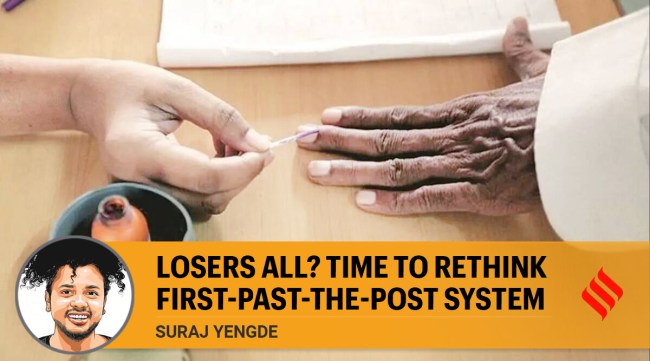Opinion Losers all? Time to rethink first-past-the-post system
In almost every election, from national, state, to local governments, or even at the office level, one has to play the game of dirty craftsmanship to get a sizeable vote share in elections. Due to the nature of India’s democracy, votes are enshrined in caste and religion.
 Ideally, people should vote for their candidates. But this happens in rare circumstances. Local leaders piggyback on national leaders in their election campaigns.
Ideally, people should vote for their candidates. But this happens in rare circumstances. Local leaders piggyback on national leaders in their election campaigns. We need to figure out a way to the existing unfair electoral roll call. It comes across as an untrustworthy method wholesomely relying on political machinations, under the table dealings, and a game of winning instead of representing.
In almost every election, from national, state, to local governments, or even at the office level, one has to play the game of dirty craftsmanship to get a sizeable vote share in elections. Due to the nature of India’s democracy, votes are enshrined in caste and religion.
The current system in place is called the first-past-the-post system (FPTP). The candidate with a diversity or plurality of votes gets elected. The candidate does not need to have a majority. They just need to have more votes than all the others contesting the same seat. So, if there are four strong candidates with equal possibility of gaining representation, the votes are divided four ways. The winner could be someone with, say, 26 per cent of the votes; the other candidates who scored more than 20% do not have any chance of seeing the gates of the zilla parishad, municipality, Assembly or Parliament.
As a result, political parties put up candidates who do not alienate the majority of voters. Since Dalits, Adivasis and women candidates have only a long shot at winning, parties are discouraged to field candidates from minority groups outside the reserved seats.
Under such intense representation protocols, the vote share must be co-opted for the one candidate to win. Thus, backdoor dealings are done without the poor voter having any idea about the fate of their vote.
Such is the nature of this politics that even notable leaders have faced defeat due to communal division of votes under the FPTP system. Even the tallest leader of his times, Dr Ambedkar, couldn’t see the doors of the Lok Sabha.
We need to reconsider our election model. Do we still follow the unrepresentative model of government where its vote share may not be in the majority? Take, for example, the BJP in 2014. The party had a vote share of merely 31%, the lowest percentage of any party to win the majority seats. How is this democratic? Going by FPTP, vote share does not amount to representation in seats. If, say, a party has more than 15% votes, that needn’t reflect its seat share in Parliament or the Assembly.
FPTP can work well in smaller countries with manageable election logistics. In India, it is not a viable option. The purpose of FPTP was geared towards having a two-party system, with minority, small parties not being bothersome coalition partners. But Indian elections since 1952 have undergone massive social changes. This has contributed to each caste polity reclaiming its share, giving rise to coalition governments, thus going against the maxim of FPTP.
Ideally, people should vote for their candidates. But this happens in rare circumstances. Local leaders piggyback on national leaders in their election campaigns.
It is only fair to demand that the parties should have representation in Parliament or Assembly according to their vote share. Having a sizeable vote and not having representation in the House defeats the purpose of those voters who have cast a vote for their party. If the party loses, does it mean their votes are wasted?
Ideally, as seen in the UK and Canada, where FPTP operates, the MP is accountable to their constituency. In India, where even a small parliamentary constituency has a population of 1.5 to 2.5 million, it is a fiefdom of India’s feudal politics. The MPs can also defect from their party in the interest of their constituents in the aforementioned countries. In India, anti-defection law makes it harder for the candidate to stand by his or her constituents and instead they follow the diktats of their leadership.
Smaller parties need to exist as rightful partners in India’s electoral politics. However, due to the current system, they are forced to either get co-opted or aligned with the interests of national parties, defeating the purpose of federalism and local self-government. The BJP, with its majority, has a responsibility toward its citizens. They can correct the current fallouts. Today they are ruling. Tomorrow they might struggle. Thus, a method combining FPTP and proportional representation needs to be charted outt for the health of India’s republicanism.
(Suraj Yengde, the author of Caste Matters, curates the fortnightly ‘Dalitality’ column)






